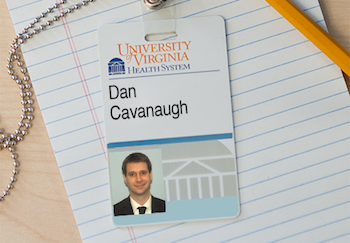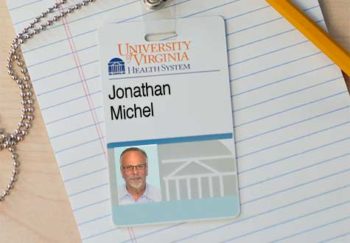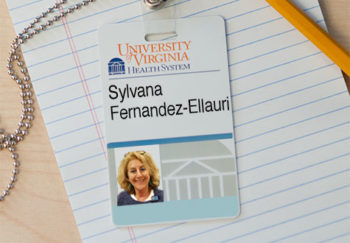 In the plush, quiet ground floor of the Claude Moore Health Science Library, Dan Cavanaugh, curator of Historical Collections, and his staff of two librarians are trying to save us from the coming digital dark age.
In the plush, quiet ground floor of the Claude Moore Health Science Library, Dan Cavanaugh, curator of Historical Collections, and his staff of two librarians are trying to save us from the coming digital dark age.
“Think about it this way,” says Cavanaugh, “Over the past 20 years much of the work in the Health System has been done using digital platforms, but few people recognize the historical importance of digital content. It is our job to ensure that both digital and print records are preserved.”
UVA Health System History
While their offices may be nestled amid anatomical illustrations from the Enlightenment, Historical Collections has a wide range of responsibilities. On one side are the things that people usually associate with librarians: historical documents and artifacts that expand and deepen our understanding of UVA’s history of medicine and health sciences.
The other side is documenting UVA Health System. This isn’t just for historical value; it’s to comply with public records guidelines. Laws like the Virginia Public Records Act mandates how, in what form and how many of copies of documents have to be archived and made available to the public on request. Compliance is an important part of a curator’s job.
“We collect a wide range of permanent records that document the history of UVA Health System” Cavanaugh says. “Including annual reports, photos and videos.”
Academic Library Science: A Competitive Field
Cavanaugh holds a bachelor’s degree in archaeology, a master’s degree in history and a master’s in library science. Like many others in his field, he had several internships and industry experience before working as an academic librarian.
But that’s just the academic and professional background that you have to have. The digital part of the job is constant and ever changing. You have to be familiar with content management systems, blog platforms and data science.
“We curate content,” says Cavanaugh. “Today’s librarian needs to be comfortable working with digital technologies.”
The Digital Dark Age
I recently worked on a project with historical collections where I had to look up the history of organ transplants at UVA. The records from the 1970s through about 1998 were easy to find — newspaper clippings, internal magazines and newsletters, photos and interdepartmental memos were in my inbox about two days after I made the request. But finding stories about transplant recipients after around 2005 were harder.
“That’s when everything went digital,” says Cavanaugh. Most of the internal publications either stopped entirely or were distributed via email or published online, in formats or on platforms that no longer exist. Digital photos and documents start to degrade after 5-7 years. Servers, where a lot of departmental or internal documents are stored, aren’t maintained when we upgrade or update technology.
“People don’t usually think about things being ‘historical’ until about 30 years pass,” he says. “Now, people are interested in the 1980s and 1990s. In a decade or so people will try to find documents from the early 2000s, and if we don’t develop the digital infrastructure, we won’t have that historical record.”
Visit Historical Collections
Check out their online exhibits.
Cavanaugh and his colleagues talk to departments all over the health system to get team members to think about how they’re managing their records and to let members know that the library is there to preserve valuable historical content.
“Do you want to document and preserve what happened in your department, what major initiatives you undertook? We can help preserve that institutional knowledge and memory of the day-to-day operations at the Health System.”
One day someone will need information about the Health System in the 2010s —maybe to analyze trends in safety or outcomes, or to research transplant recipients fifty years from now. The work that Historical Collections does today will make sure that those researchers in the future don’t come up empty handed.

